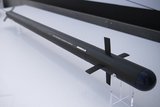US Marine Corps selects Silvus radios for ground vehicle comms
USMC ACV crews will use Silvus StreamCaster radios for on-the-move communications as part of the NOTM system. (Photo: USMC)
Silvus Technologies announced on 6 December that Marine Corps Systems Command (MCSC) has selected StreamCaster 4400 MANET (mobile area network) radios for use in the Networking On-the-Move (NOTM) communications system uused in the marine corps' Joint Light Tactical Vehicles (JLTVs) and Amphibious Combat Vehicles (ACVs).
According to a company release, StreamCaster radios were selected due to their ability to create a self-organising mesh network across multiple spectrum bands at high data rates.
The 4400 MANET will enable Marine Air-Ground Task Forces to access SATCOM, and connect and network dispersed vehicles, air assets and dismounted units. Marines can use NOTM to transmit information to commanders and increase situational awareness in hostile environments.
Related Articles
GDLS bets on innovative capabilities in USMC ARV competition
US Marine Corps tests Northrop Grumman AN/TPS-80 Ground/Air Task Oriented Radar
StreamCaster radios also support the proprietary Mobile Networked MIMO (MN-MIMO) waveform to enable operations in congested and contested spectrum environments.
Related Programmes in Defence Insight
ACV - Additional Order 2 (US - USMC)
ACV - Additional Order 1 (US - USMC)
Related Equipment in Defence Insight
More from Land Warfare
-
![Elbit Systems looks to enhance automation for Israeli artillery systems]()
Elbit Systems looks to enhance automation for Israeli artillery systems
Automation efforts on the Roem and Sigma howitzers will maintain a ‘man in a loop’ configuration as the Israeli company focuses on the export market.
-
![How Spain’s acquisition of PAC-3 MSE can boost European air defence]()
How Spain’s acquisition of PAC-3 MSE can boost European air defence
Madrid will increase interoperability with the other seven users of next-gen Patriot in the region.
-
![MBDA announces new VSHORAD system at Farnborough International Airshow 2024]()
MBDA announces new VSHORAD system at Farnborough International Airshow 2024
The VSHORAD supersonic single-operator interceptor air defence system was unveiled at Farnborough.
-
![Raytheon notes CUAS laser success and pushes for faster air defence manufacture]()
Raytheon notes CUAS laser success and pushes for faster air defence manufacture
Raytheon’s Patriot air defence system has been in high demand with orders and commitment coming in from Germany, Romania and Spain.
-
![BAE Tridon MK2 fitted with Chess Dynamics fire control system]()
BAE Tridon MK2 fitted with Chess Dynamics fire control system
The collaboration between the defence giant and the gunfire control specialist will help deliver a modular anti-drone solution.
























